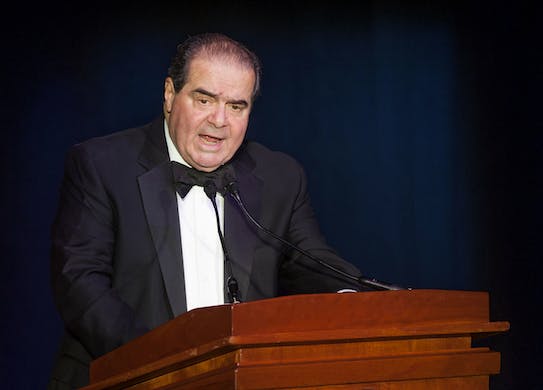With an Assist From Antonin Scalia, Alvin Bragg Argues That the President Is Not a ‘Federal Officer’
The theory is proffered as part of the district attorney’s bid to keep President Trump in state court.

District Attorney Alvin Bragg is making an unusual argument to a judge of the Southern District of New York to keep the country’s highest-profile defendant in state court — namely, that the president of the United States, in whom all the government’s executive power resides, is not a “federal officer.”
In a “Memorandum of Law” — the index of cases cited runs to four pages — Mr. Bragg argues that Judge Alvin Hellerstein “should reject defendant Donald J. Trump’s effort to remove this prosecution from state court.” That effort to remove to federal court depends on Mr. Trump’s argument that he was a federal officer when the acts in question were committed. He was the president.
The Supreme Court has held that a defendant’s case belongs in federal court when it turns on “acts done by him under color of federal authority and in enforcement of federal law.” Mr. Bragg argues that the payments to a former attorney, Michael Cohen, “had nothing to do with the defendant’s responsibilities” as president. Mr. Trump counters that he signed them in the Oval Office.
Mr. Bragg’s argument reaches for constitutional sheetrock, maintaining that there is a “serious question about whether the President of the United States is an ‘officer’ entitled to invoke removal at all.” His position is that the “term does not typically encompass the President when used in federal statutes.” If the president is an officer, he is not entitled to removal.
The Supreme Court, Mr. Bragg argues, “has long interpreted ‘officer’ to exclude the President and Vice President because those officials are elected to their positions rather than appointed.” One source for that proposition is a memo written by none other than Antonin Scalia, then serving as an assistant attorney general in the White House’s Office of Legal Counsel.
The Great Scalia, whose Supreme Court service lay ahead of him, wrote in 1974 to the associate counsel to the president, Kenneth Lazarus, that “when the word ‘officer’ is used in the Constitution, it invariably refers to someone other than the President or Vice President” unless “specifically stated.”
Scalia, though, writes that it “would be undesirable as a matter of policy for the President or Vice President to engage in conduct proscribed by the Order or regulations.” Those regulations relate to “ethical standards and financial disclosure regulations.” President Ford was then in office, Watergate and battles over executive power still raw. The order in question was signed by President Johnson.
The Constitution’s Appointments Clause ordains that the president “shall nominate, and by and with the Advice and Consent of the Senate, shall appoint Ambassadors, other public Ministers and Consuls, Judges of the Supreme Court, and all other Officers of the United States, whose Appointments are not herein otherwise provided for.”
The national parchment allows, though, that the “Congress may by Law vest the Appointment of such inferior Officers, as they think proper, in the President alone, in the Courts of Law, or in the Heads of Departments.” That phrase has served as the locus of debate over the appointment, authority, and autonomy of special counsels.
Fourteen years after writing this memo, Scalia would dissent to the majority opinion in Morrison v. Olson, which held that independent counsels — a precursor to today’s special counsels — were constitutional. He writes that the “Founders conspicuously and very consciously declined to sap the Executive’s strength in the same way they had weakened the Legislature: By dividing the executive power.”
In championing what he calls a “unitary executive,” Scalia explains that the “President’s constitutionally assigned duties include complete control over investigation and prosecution of violations of the law, and that the inexorable command of Article II is clear and definite: the executive power must be vested in the President of the United States.”
In a 2010 case, Free Enterprise Fund v. Public Company Accounting Oversight Board, Chief Justice Roberts observed that the “people do not vote for the ‘Officers of the United States.’” Rather, “officers of the United States” are appointed. Justice Scalia joined his majority. The Disqualification Clause of the 14th Amendment likewise lists “officers” as a distinct category from the president.
Back to that memo, though. In sussing out whether the president and vice president are “officers,” Scalia marks an important point. He writes that “the Vice President is an independent constitutional office and the Vice President is independently elected. Just as the President cannot remove the Vice President, it would seem he may not dictate his standards of conduct.”
A recent case, also out of New York and also concerning President Trump, could complicate Mr. Bragg’s argument that the chief executive is not an officer. Last year, in Carroll v. Trump, the United States Court of Appeals for the Second Circuit found that the president is an “employee” for the purposes of the Westfall Act.
That law from 1988 that seeks to protect federal employees from common law tort lawsuits while engaged in their duties for the government. Mr. Bragg avers that the statutory language in that case is “distinct.”

